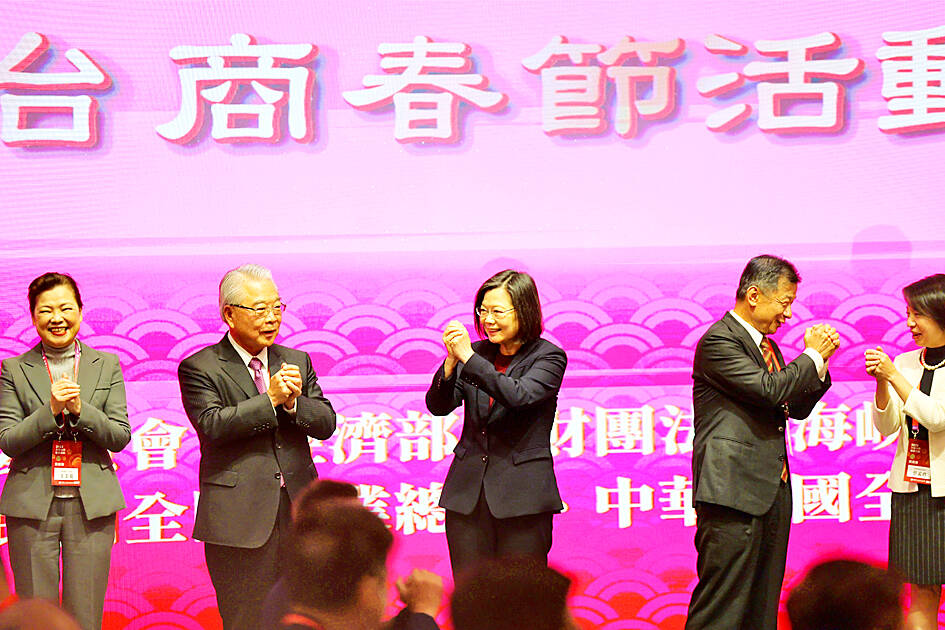Taiwan is willing to negotiate with China about reducing border restrictions in a mutually respectful dialogue, President Tsai Ing-wen (蔡英文) said yesterday.
Tsai made the remark at a Straits Exchange Foundation Lunar New Year event for Taiwanese entrepreneurs conducting business in China.
Bilateral interactions should resume as the COVID-19 pandemic eases, so long as safeguards for public health are in place, she said.

Photo: CNA
Beijing has requested Taiwan’s cooperation in reopening 16 points of entry for air travel across the Strait, China’s Taiwan Affairs Office said on Wednesday, adding that travel between the two sides should return to its pre-pandemic status.
Tsai said that Taipei and Beijing are equally responsible for good cross-strait relations, and that she is always open to respectful dialogue.
Taiwan is considering Beijing’s proposal, but needs the Chinese government to provide accurate data about the spread of COVID-19 in China, Mainland Affairs Council (MAC) Minister Chiu Tai-san (邱太三) told reporters on the sidelines of the foundation’s event.
Taiwan would like to work with China on the matter, and government agencies are evaluating whether the conditions permit a resumption of normal air travel, Chiu said.
Transparency about the spread of the virus in China would make Taipei more amenable to Beijing’s proposal, he added.
Fluctuations in the severity of China’s COVID-19 outbreak and the difficulties involved in navigating pandemic restrictions imposed by local Chinese governments have made Taiwanese airlines hesitant to schedule flights to a number of cities in China, he said.
China’s sudden cancelation of more than 70 percent of flights bound for Guangzhou in October last year is one example Chiu cited as a major inconvenience experienced by airlines and travelers.
Ten Taiwanese and 51 Chinese points of entry were being utilized before the pandemic, and only four are open at present, he said.
The MAC is working toward maintaining the so-called “small three links” which have enabled some Taiwanese and Chinese to travel through ports on a few of Taiwan’s outlying islands, Chiu said.
The links via Kimen and Lienchiang counties remained open through the Lunar New Year by means of a special dispensation the legislature passed on Dec. 22 last year, but is set to expire on Feb 20.
The MAC’s goal is to extend the special act, which more than 2,600 travelers have utilized since the reopening, Chiu said.
The percentage of travelers who have been confirmed to have COVID-19 has dropped steadily from 19 percent on the first day of the program to 2 percent at present, which is an encouraging sign for safe travel across the Strait, he said.
The MAC is to confer with the Ministry of Transportation and Communications, the Ministry of Health and Welfare and the Central Epidemic Command Center before making a decision, he said.

AIR SUPPORT: The Ministry of National Defense thanked the US for the delivery, adding that it was an indicator of the White House’s commitment to the Taiwan Relations Act Deputy Minister of National Defense Po Horng-huei (柏鴻輝) and Representative to the US Alexander Yui on Friday attended a delivery ceremony for the first of Taiwan’s long-awaited 66 F-16C/D Block 70 jets at a Lockheed Martin Corp factory in Greenville, South Carolina. “We are so proud to be the global home of the F-16 and to support Taiwan’s air defense capabilities,” US Representative William Timmons wrote on X, alongside a photograph of Taiwanese and US officials at the event. The F-16C/D Block 70 jets Taiwan ordered have the same capabilities as aircraft that had been upgraded to F-16Vs. The batch of Lockheed Martin

US President Donald Trump yesterday announced sweeping "reciprocal tariffs" on US trading partners, including a 32 percent tax on goods from Taiwan that is set to take effect on Wednesday. At a Rose Garden event, Trump declared a 10 percent baseline tax on imports from all countries, with the White House saying it would take effect on Saturday. Countries with larger trade surpluses with the US would face higher duties beginning on Wednesday, including Taiwan (32 percent), China (34 percent), Japan (24 percent), South Korea (25 percent), Vietnam (46 percent) and Thailand (36 percent). Canada and Mexico, the two largest US trading

GRIDLOCK: The National Fire Agency’s Special Search and Rescue team is on standby to travel to the countries to help out with the rescue effort A powerful earthquake rocked Myanmar and neighboring Thailand yesterday, killing at least three people in Bangkok and burying dozens when a high-rise building under construction collapsed. Footage shared on social media from Myanmar’s second-largest city showed widespread destruction, raising fears that many were trapped under the rubble or killed. The magnitude 7.7 earthquake, with an epicenter near Mandalay in Myanmar, struck at midday and was followed by a strong magnitude 6.4 aftershock. The extent of death, injury and destruction — especially in Myanmar, which is embroiled in a civil war and where information is tightly controlled at the best of times —

China's military today said it began joint army, navy and rocket force exercises around Taiwan to "serve as a stern warning and powerful deterrent against Taiwanese independence," calling President William Lai (賴清德) a "parasite." The exercises come after Lai called Beijing a "foreign hostile force" last month. More than 10 Chinese military ships approached close to Taiwan's 24 nautical mile (44.4km) contiguous zone this morning and Taiwan sent its own warships to respond, two senior Taiwanese officials said. Taiwan has not yet detected any live fire by the Chinese military so far, one of the officials said. The drills took place after US Secretary